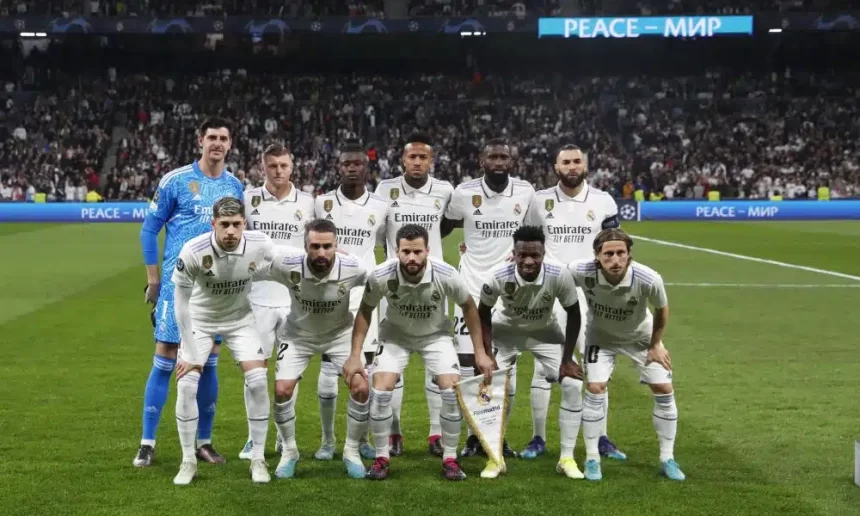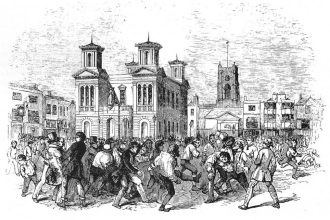1. Number of Players
A match is played by two teams, each with a maximum of eleven players; one must be the goalkeeper. A match may not start or continue if either team has fewer than seven players. If a team has fewer than seven players because one or more players have deliberately left the field of play, the referee is not obliged to stop play and the advantage may be played, but the match must not resume after the ball has gone out of play if a team does not have the minimum number of seven players. If the competition rules state that all players and substitutes must be named before kick-off and a team starts a match with fewer than eleven players, only the players and substitutes named in the starting line-up may take part in the match upon their arrival.
2. Number of substitutions
OFFICIAL COMPETITIONS The number of substitutes, up to a maximum of five, which may be used in any match played in an official competition will be determined by FIFA, the Confederation, or the national football association. For men’s and women’s competitions involving the 1st teams of clubs in the top division or senior ‘A’ international teams where competition rules permit a maximum of five substitutes to be used, each team:
- has a maximum of three substitution opportunities*
- may additionally make substitutions at half-time
*Where both teams make a substitution at the same time, this will count as a used substitution opportunity for both teams. Multiple substitutions (and requests) by a team during the same stoppage in play count as one used substitution opportunity.
EXTRA TIME
- If a team has not used the maximum number of substitutes and/or substitution opportunities, any unused substitutes and substitution opportunities may be used in extra time
- Where competition rules permit teams to use one additional substitute in extra time, each team will have one additional substitution opportunity
- Substitutions may also be made in the period between full-time and the start of extra time, and at half-time in extra time – these do not count as used substitution opportunities
The competition rules must state:
- how many substitutes may be named, from three to a maximum of fifteen
- whether one additional substitute may be used when a match goes into extra time (whether or not the team has already used the full number of permitted substitutes)
OTHER MATCHES In senior ‘A’ international team matches, a maximum of fifteen substitutes may be named of which a maximum of six may be used.
In all other matches, a greater number of substitutes may be used provided that:
- the teams reach an agreement on a maximum number
- the referee is informed before the match
If the referee is not informed, or if no agreement is reached before the match, each team is allowed a maximum of six substitutes. RETURN SUBSTITUTIONS The use of return substitutions is only permitted in youth, veterans, disability, and grassroots football, subject to the agreement of the National Football Association, confederation, or FIFA.
3. Substitution procedure
The names of the substitutes must be given to the referee before the start of the match. Any substitute not named by this time may not take part in the match. To replace a player with a substitute, the following must be observed:
- the referee must be informed before any substitution is made
- the player being substituted receives the referee’s permission to leave the field of play, unless already off the field, and must leave by the nearest point on the boundary line unless the referee indicates that the player may leave directly and immediately at the halfway line or another point (e.g. for safety/security or injury)must go immediately to the technical area or dressing room and takes no further part in the match, except where return substitutions are permitted
- if a player who is to be substituted refuses to leave, play continues
The substitute only enters:
- during a stoppage in play
- at the halfway line
- after the player being replaced has left
- after receiving a signal from the referee
The substitution is completed when a substitute enters the field of play; from that moment, the replaced player becomes a substituted player and the substitute becomes a player and can take any restart. All substituted players and substitutes are subject to the referee’s authority whether they play or not.
4. Changing the goalkeeper
Any of the players may change places with the goalkeeper if:
- the referee is informed before the change is made
- the change is made during a stoppage in play
5. Offences and sanctions
If a named substitute starts a match instead of a named player and the referee is not informed of this change:
- the referee allows the named substitute to continue playing
- no disciplinary sanction is taken against the named substitute
- the named player can become a named substitute
- the number of substitutions is not reduced
- the referee reports the incident to the appropriate authorities
If a substitution is made during the half-time interval or before extra time, the procedure must be completed before the match restarts. If the referee is not informed, the named substitute may continue to play, no disciplinary action is taken and the matter is reported to the appropriate authorities.
If a player changes places with the goalkeeper without the referee’s permission, the referee:
- allows play to continue
- cautions both players when the ball is next out of play but not if the change occurred during half-time (including half-time of extra time) or the period between the end of the match and the start of extra time and/or penalties (penalty shoot-out).
For any other offenses:
- the players are cautioned
- play is restarted with an indirect free kick, from the position of the ball when play was stopped
6. Players and substitutes sent off
A player who is sent off:
- before submission of the team list can not be named on the team list in any capacity
- after being named on the team list and before kick-off may be replaced by a named substitute, who can not be replaced; the number of substitutions the team can make is not reduced
- after the kick-off cannot be replaced
A named substitute who is sent off before or after the kick-off may not be replaced.7. Extra persons on the field of play coach and other officials named on the team list (with the exception of players or substitutes) are team officials. Anyone not named on the team list as a player, substitute, or team official is an outside agent. If a team official, substitute, substituted or sent-off player or outside agent enters the field of play the referee must:
- only stop play if there is interference with the play
- have the person removed when play stops
- take appropriate disciplinary action
If play is stopped and the interference was by:
- a team official, substitute, substituted or sent-off player, play restarts with a direct free kick or penalty kick
- an outside agent, play restarts with a dropped ball
If a ball is going into the goal and the interference does not prevent a defending player playing the ball, the goal is awarded if the ball enters the goal (even if contact was made with the ball) unless the interference was by the attacking team.8. Player outside the field of play if a player who requires the referee’s permission to re-enter the field of play re-enters without the referee’s permission, the referee must:
- stop play (not immediately if the player does not interfere with play or a match official or if the advantage can be applied)
- caution the player for entering the field of play without permission
If the referee stops play, it must be restarted:
- with a direct free kick from the position of the interference
- with an indirect free kick from the position of the ball when play was stopped if there was no interference
A player who crosses a boundary line as part of a playing movement does not commit an offense.
9. Goal scored with an extra person on the field of play
If, after a goal is scored, the referee realizes, before play restarts, an extra person was on the field of play when the goal was scored, and that person interfered with play:
- the referee must disallow the goal if the extra person was: a player, substitute, substituted player, sent-off player, or team official of the team that scored the goal; play is restarted with a direct free kick from the position of the extra person outside agent who interfered with play unless a goal results as outlined above in ‘extra persons on the field of play’; play is restarted with a dropped ball
- the referee must allow the goal if the extra person was: a player, substitute, substituted player, sent-off player, or team official of the team that conceded the goal an outside agent who did not interfere with the play
In all cases, the referee must have the extra person removed from the field of play. If, after a goal is scored and play has restarted, the referee realizes an extra person was on the field of play when the goal was scored, the goal can not be disallowed. If the extra person is still on the field the referee must:
- stop play
- have the extra person removed
- restart with a dropped ball or free kick as appropriate
The referee must report the incident to the appropriate authorities.10. Team Captain
The team captain has no special status or privileges but has a degree of responsibility for the behavior of the team.
By: IFAB Laws of the Game 2023-24





